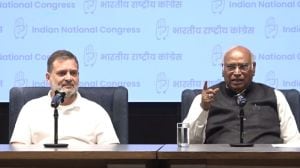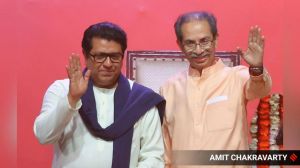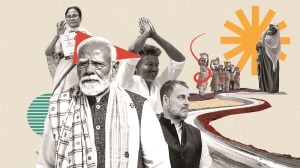America146;s choice
President Musharraf8217;s declaration of a state of emergency against his own government on November 3...

President Musharraf8217;s declaration of a state of emergency against his own government on November 3, followed by large-scale arrests of his opponents, was a slap in the face of Washington and the Bush Administration. The American press has taken a very critical stance. Senior US officials, including President Bush himself, have been advising Musharraf since August 8212; when he apparently came close to declaring an emergency 8212; not to declare martial law/emergency, to work with the established political parties to restore democracy, and to take off his uniform. All three steps are now in doubt. There is much public hand-wringing by Bush administration officials as they try to come up with something to salvage a Pakistan policy.
So far, US concerns to keep President Musharraf committed to the war on terrorism have trumped other issues like democracy and a mediocre record on containing terrorism at home. Almost every senior American official since 9/11 has lavishly praised his anti-terrorism efforts and wishfully predicted that he was working for the restoration of democracy. This policy was very personalised, relying on Musharraf to keep his country committed to the global war on terrorism in the face of limited public support in Pakistan for the engagement. The war on terrorism is widely regarded in Pakistan as a war against Islam. Even now, the US reaction to the declaration of emergency demonstrates the overriding concern with terrorism. The secretary of state, while publicly criticising the emergency declaration, argues that the US still has a war on terrorism to fight. The Pentagon has issued a statement that arms support would continue; Pakistan is a frontline state and its cooperation, however flawed, is important for the political future of Afghanistan.
Musharraf8217;s willingness to brush off US advice against imposing an emergency suggests that he believes that this history of according priority to the war on terrorism will continue, especially now that the security situation in Afghanistan has worsened. Moreover, Musharraf is well aware that George W. Bush, a 8216;lame duck8217; president with a low popular approval rating, would be reluctant to get tough with a person whose policies can make the difference between success and failure of the effort to contain a surging radicalism in Afghanistan. Fighting the Al Qaeda/Taliban in Afghanistan has added importance given the highly tentative situation in Iraq. The fight in Afghanistan continues to receive popular support in the US while that in Iraq does not. But Musharraf8217;s ability to exploit this vulnerability is short-lived. A new US President will not have the same personal stake in the tactics adopted by George W. Bush. Both likely Democrat nominees, Barack Obama and Hillary Clinton, are openly critical of Musharraf.
Public criticism of Musharraf inside the US has been on the rise for the past year and the emergency declaration has reinforced scepticism about him. Senator Biden, chair of the Senate Foreign Relations Committee, issued a statement that the US needs to focus relations on Pakistan as a country and not on its current leader, a subtle way of saying that we are neutral on who is in charge. Secretary of State Condoleezza Rice stated publicly that the US would review its huge assistance programme to Pakistan, which amounts to about one hundred and fifty million dollars a month, with the cumulative amount so far about eleven billion dollars.
The dilemma is how to exercise influence on Musharraf. While unpopular at home, he still has the all-important support of the military. He has appointed the regional corps commanders and they apparently remain loyal to him. The military, a corporate institution with a strong sense of its mission as guarantor of the country8217;s security, will determine the pace of political change for many years to come. While Musharraf has low popular approval ratings, his opposition is divided and there is no political figure acceptable as a leader to the various groups opposing him. Cutting off all assistance and contacts with the military establishment is a sure way of becoming irrelevant to it. That was tried once before with the nuclear-related Pressler Amendment sanctions imposed in the early 1990s resulting in a cut-off of American military and economic assistance. The result was a virtual disappearance of any American influence with the military and a generation of Pakistani officers lacking contacts with their American counterparts.
Two possibilities exist to nudge Musharraf to return to a democratic process. One is to condition the level of assistance on specific steps to restore democracy, a proposal that has considerable support within the US Congress and the influential US press. Pakistan is heavily dependent economically on US largesse and a substantial cut would have an adverse impact. Secondly, the US could work with the Saudis and China, two countries probably with even greater influence on Musharraf than the US, to nudge Pakistan back toward a more democratic path. While these two countries have no real commitment to democracy themselves, they may understand that a democratic future in Pakistan would produce a more stable country. For both, a stable Pakistan is important for strategic reasons. They probably worry that the emergency proclamation puts President Musharraf on a confrontation course with the entire opposition, a situation that could trigger increased radical violence. Even before the emergency proclamation, radical religiously-inspired violence was on the rise. In fact, the surge in such violence was Musharraf8217;s justification for the imposition of the emergency. It is, in fact, a danger that could lap over into both Saudi Arabia and China.
The situation in Pakistan is, of course, also a strategic concern for both India and the US. The war on terrorism in South Asia will fail unless the growing radical threat in Pakistan is contained. Washington and New Delhi should confer more closely on how to handle the situation in Pakistan. As with Saudi Arabia and China, a stable Pakistan is in their interests as well. Terrorism in South Asia, as has been demonstrated repeatedly, is a regional phenomenon and should be approached on a regional basis.
The writer is associate director, South Asia Studies Programme, School of Advanced International Studies, Johns Hopkins University, Washington DC
- 01
- 02
- 03
- 04
- 05































